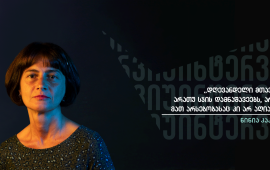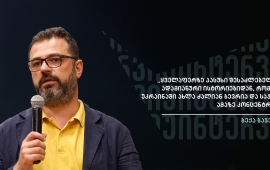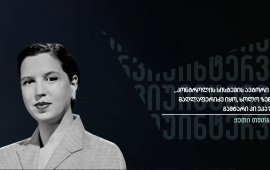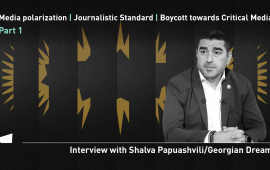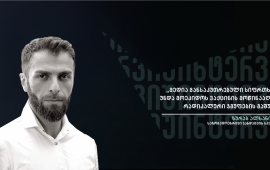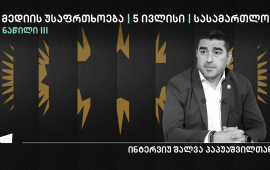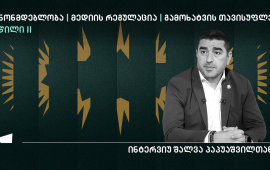მოკლედ, ჯეინ ლიტვინენკოზე:
- ჯეინ ლიტვინენკო უფროსი მკვლევარი იყო ჰარვარდის უნივერსიტეტში.
- ის, თითქმის 5 წლის განმავლობაში მუშაობდა ტექნოლოგიური გუნდის უფროს რეპორტიორად გამოცემა BuzzFeed News-ში.
- 2020 წელს მიიღო The Digital Publishing Award-ისგან ჯილდო და “დეზინფორმაციის გამოაშაკარავებაში გლობალურ ლიდერად” დასახელდა.
მოკლედ, ინტერვიუს მთავარი გზავნილები
- “ბევრი რეპორტიორი ონლაინ გამოძიების უნარებს აღიქვამს ისე, თითქოს ეს სხვისი გასაკეთებელია. სინამდვილეში, ინფორმაციის გადამოწმების საბაზისო უნარები ყველა რეპორტიორს უნდა ჰქონდეს.”
- “პროპაგანდა და დეზინფორმაცია ქმნის სოციალურ განხეთქილებას და დისკუსია გადააქვს ომის არაჰუმანურობიდან ისეთ რამეზე, რაც პოლიტიკურ ფეხბურთს უფრო ჰგავს.”
- “ჟურნალისტებისგან და ტრადიციული მედიისგან განსხვავებით, დეზინფორმაციისა და პროპაგანდის გამვრცელებლებს აქვთ ფუფუნება, იყვნენ ადაპტირებული ტექნოლოგიასთან.”
- თუ ჯერ კიდევ 5-6 წლის წინ დეზინფორმაცია ძირითადად ყალბი ანგარიშებიდან ვრცელდებოდა, დღეს პროპაგანდისტები ნამდვილი ადამიანები არიან.
- ბევრად მარტივია ებრძოლო სოციალური ქსელის ყალბ ანგარიშებსა და დეზინფორმაციის გამავრცელებელ ვებგვერდებს. ნამდვილ, გაცხადებულ პროპაგანდისტ "ინფლუენსერებთან" ბრძოლა გაცილებით რთულია.
- “ვხედავთ პროპაგანდისტებს, რომლებიც თავიანთ თავებს ჟურნალისტებს უწოდებენ.”
- “არიან ადამიანები, რომლებიც პროპაგანდის გავრცელებას თავიანთ საქმედ აქცევენ და ყველა ქვეყანას, ყველა რეგიონს ეყოლება თავისი ხალხი, რომლებიც ამას აკეთებენ და არსებობენ გავლენიანი ადამიანები, რომლებიც ზოგჯერ შემთხვევით, ზოგჯერ კი გამიზნულად ავრცელენენ პროპაგანდას.”
- “როდესაც სოციალური მედიის კომპანიებზე ვსაუბრობთ, ზოგადად ინდივიდუალურად ვსაუბრობთ მათზე, მაგრამ ინფორმაცია ერთი პლატფორმიდან მუდმივად სხვა პლატფორმებზე ვრცელდება.”
როგორ შეცვალა დეზინფორმაციის ინსტრუმენტები ბოლო წლებში?
დეზინფორმაციის კვლევა 2016 წლის ნოემბერში დავიწყე, მაშინ ცრუ და ჰიპერპარტიული ინფორმაციის დიდი ნაწილი, რომელსაც დეზინფორმაციის ქოლგის ქვეშ ვაერთიანებ, ვებგვერდებზე იყო განთავსებული. ეს იყო ტექსტის ფორმით და ვებგვერდები ჰგავდა ახალი ამბების მედიის ვებგვერდებს. იყო ბევრი ყალბი ანგარიშიც, რომლებიც სოციალურ ქსელებს იყენებდნენ, განსაკუთრებით აშშ-ის კონტექსტში, მაგრამ გლობალურადაც.
ახლა დეზინფორმაციისა და მისინფორმაციის პროპაგანდა დიდწილად ვიზუალურია და გავლენიანი პირებისგან მოდის. ეს იმას ნიშნავს, რომ მნიშვნელოვანი ახალი ამბების, კრიზისის, საპროტესტო აქციის, ომის, ან ბუნებრივი კატასტრიფის დროს ცრუ ინფორმაციის დიდი ნაწილი დაფუძნებულია ფოტოზე ან ვიდეოზე, რომლებიც კონტექსტიდანაა ამოღებული და შემდეგ ყალბ კონტექსტში ჩასმული.
ასევე ვხედავთ ადამიანებს, რომლებმაც რეპუტაცია და აუდიტორია დეზინფორმაციის გავრცელებით შეიქმნეს. თუ აქამდე ეს ანონიმურად იყო მართული, ან მხოლოდ ფინანსურად მოტივირებული საინფორმაციო კამპანიები არსებობდა (რასაც, რა თქმა უნდა, დღესაც ვხვდებით), ახლა უფრო შესაძლებელი გახდა იყო პროპაგანდის გამავრცელებელი ადამიანი - პროპაგანდისტი "ინფლუენსერი".
ეს კი უფრო დიდი პრობლემაა, ვიდრე ხუთი წლის წინ: ყალბი ანგარიშებისა და ვებგვერდების წაშლა მარტივადაა შესაძლებელი. ამ მიმართულებით ვხედავთ თუნდაც არასრულყოფილ ნაბიჯებს სოციალური მედია კომპანიების მიერ, რომლებიც ყალბ ანგარიშებთან ბრძოლას ცდილობენ.
თუმცა ბევრად უფრო რთულია, როდესაც ადამიანი ხდება პროპაგანდის გამავრცელებელი გავლენიანი პირი. მიუხედავად იმისა, რომ ეს შეიძლება ეწინააღმდეგებოდეს სოციალური მედიის კომპანიების ზოგიერთ სტანდარტს, რეალურ ადამიანებს იმავენაირად არ პასუხობენ, როგორც ყალბ ანგარიშებს.
ჟურნალისტებისგან და ტრადიციული მედიისგან განსხვავებით, დეზინფორმაციისა და პროპაგანდის გამავრცელებლებს აქვთ ფუფუნება, იყვნენ ადაპტირებული ტექნოლოგიასთან.
თუ ხუთი ან ათი წლის წინ, როდესაც პრობლემა კარგად გამოკვლეული და გაშუქებული არ იყო და ამაზე ბევრი არ საუბრობდა, დეზინფორმაციის გამავრცელებლებს შეეძლოთ თავიანთ პლატფორმებზე ყველაფერი გაეკეთებინათ, რაც მოესურვებოდათ. ახლა მათ უწევთ ცოტა მეტი შემოქმედებითობის გამოჩენა.
ვინ არიან პროპაგანდის გამავრცელებელი გავლენიანი პირები?
ეს რთული კითხვაა. ბევრ ასეთ ადამიანს ვხედავთ და თუ გვსურს, ყურადღება უკრაინის წინააღმდეგ ომზე გავამახვილოთ, დეზინფორმაცია ბევრი განსხვავებული მიმართულებიდან მოდის. ამის ერთ-ერთი მაგალითია თავად რუსეთი და, რა თქმა უნდა, რუსული ოფიციალური არხები.
ეს მოიცავს რუსეთის ხელისუფლების წარმომადგენლებს, რომლებიც სოციალურ ქსელსა და ტრადიციულ მედიას იყენებენ თავიანთი გზავნილების გასავრცელებლად. განსაკუთრებით საინტერესოა, რომ რუსეთის საელჩოს ანგარიშები “ტვიტერზე” პროპაგანდის დიდი გამავრცელებლები არიან, ზოგიერთ შემთხვევში ისინი რეპორტიორების წინააღმდეგ შევიწროვების კამპანიებსაც კი უძღვებიან და ამას ისე აკეთებენ, რომ სოციალური მედიის პლატფორმები არ პასუხობენ.
ტრადიციული მედიის გარდა ვხედავთ, რომ რუსეთი გაეროს პლატფორმას პროპაგანდისა და ცრუ ინფორმაციის გასავრცელებლად იყენებს. ასევე ვხედავთ პროპაგანდას, რომელიც რუსეთის არმიასთან არის დაკავშირებული. ეს ჩემთვის ერთ-ერთი ყველაზე საშიში პრობლემაა, რადგან ვხედავთ პროპაგანდისტებს, რომლებიც თავიანთ თავებს ჟურნალისტებს უწოდებენ და ხშირად ისინი არიან პირველი ან ერთადერთი ადამიანები ოკუპირებულ ტერიტორიებზე. ინფორმაციას მათგან იღებ და ოკუპირებულ ტეროტორიებზე შესვლა და ამ ინფორმაციის სიზუსტის გადამოწმება არ შეგიძლია.
ერთი კონკრეტული შემზარავი შემთხვევაა, რომელიც გონებაში ჩამრჩა. მარიუპოლში იყო ქალი, რომელსაც სხეულზე სვასტიკის ნიშანი ჰქონდა ამომწვარი. პირველები, ვინც ეს ფოტოები გამოაქვეყნეს რუსი პროპაგანდისტები იყვნენ და ჩვენ, როგორც ჟურნალისტებს ან ომის დანაშაულების გამომძიებლებს არ შეგვეძლო მარიუპოლში წასვლა, რათა გაგვერკვია რა მოხდა სინამდვილეში. სამწუხაროდ, ბევრი ასეთი სიტუაციაა, როდესაც რთულდება ზუსტი ინფორმაციის მიღება, მაშინ, როცა პროპაგანდისტებს აქვთ თავისუფალი წვდომა ტერიტორიაზე.
გარდა რუსეთის დაწყებული ომისა და რუსი პროპაგანდისტებისა, არსებობენ თუ არა დეზინფორმაციისა და კონსპირაციული თეორიების გამავრცელებელი გავლენიანი პირები საერთაშორისო დონეზე?
არიან ადამიანები, რომლებიც პროპაგანდის გავრცელებას თავიანთ საქმედ აქცევენ და ყველა ქვეყანას, ყველა რეგიონს ეყოლება თავისი ხალხი, რომლებიც ამას აკეთებენ და არსებობენ გავლენიანი ადამიანები, რომლებიც ზოგჯერ შემთხვევით, ზოგჯერ კი გამიზნულად ავრცელენენ პროპაგანდას. ვფიქრობ, ეს ორი განსხვავებული სუბიექტია.
ვხედავთ ბევრ პოლიტიკოსსაც, რომლებიც პოლიტიკური სარგებლისთვის იყენებს დეზინფორმაციისა და პროპაგანდის ნარატივებს. განსაკუთრებით პანდემიის პერიოდში კი ბევრი ცნობილი ადამიანი და სპორტსმენი ან საჯარო სფეროს წარმომადგენელი ვნახეთ, რომლებიც კონკრეტულად პროპაგანდის გაამავრცელებლები არ არიან, მაგრამ გააძლიერეს ასეთი ნარატივები. ეს კი გადამწყვეტი აღმოჩნდა ახალი აუდიტორიისთვის, რომლებზეც ამ ინფორმაციამ გავლენა იქონია. ორივე ეს შემთხვევა მიმდინარე პრობლემაა.
რა გავლენა აქვს სოციალურ მედიას როგორც დეზინფორმაციის გავრცელებაში, ისე მასთან ბრძოლაში?
სოციალური მედია კომუნიკაციის მთავარი საშუალებაა, მაგრამ ეს ასევე ერთ-ერთი მთავარი პლატფორმაა, აუდიტორიასთან დასაკავშირებლად. ეს აუდიტორია შეიძლება იყოს ჩვენი ოჯახის წევრები, დიდი საერთაშორისო აუდიტორია ან რაიმე შუალედი მათ შორის. მნიშვნელოვანია, აღინიშნოს, რომ პროპაგანდის პრობლემა მხოლოდ სოციალურ მედიაში არ არის. ვიცით, რომ ამ კუთხით ტრადიციული ტელევიზია, განსაკუთრებით ოლიგარქების მფლობელობაში არსებული ტრადიციული ტელევიზია, დიდი პრობლემაა. ასევე შეიძლება დიდი პრობლემა იყოს რადიოსადგურებსა და გაზეთებში. თუმცა, სოციალურ მედიას შეუძლია სხვადასხვა აუდიტორია ერთმანეთთან პირდაპირ დააკავშიროს, რასაც ვერ ახერხებს ტრადიციული მედია.
ეს კი იმას ნიშნავს, რომ სოციალური მედია საშუალებას აძლევს ბევრად უფრო ახალ აუდიტორიას ისეთი პროპაგანდისა და დეზინფორმაციის წინაშე აღმოჩნდეს, რომელის წინაშეც აქამდე ტრადიციული არხებით არ აღმოჩენილა. ვხედავთ, რომ ხშირ შემთხვევაში სოციალური მედიის კომპანიები არ იღებენ ზომებს ამ ახალი აუდიტორიის პროპაგანდისგან და დეზინფორმაციისგან დასაცავად.
ვიცით, რომ ამ კომპანიების ეფექტი უზარმაზარი და ძალიან ძლიერია. ვიცით, რომ მას შეუძლია ხელი შეუწყოს გენოციდს, გააუარესოს ომი და ამავდროულად, რესურსების განაწილება, რომელსაც ეს კომპანიები ირჩევენ არ არის მიმართული ამის თავიდან აცილებისკენ.
მხოლოდ აკადემიური კვლევებიდან ვიცით, როგორ მუშაობს ამ კომპანიების ალგორითმები, რაც გარკვეულ სურათს გვაძლევს, მაგრამ ეს ალგორითმები მუდმივად იცვლება. ამავე დროს ისინი მოგებას იღებენ ონლაინ რეკლამების საშუალებით ამ დისკუსიებიდან და მეტ აუდიტორიას იზიდავენ. ასე რომ, კონტენტის მოდერაცია და თვალყურის დევნება არ არის ისე ძლიერი, როგორც საჭიროა იმ საფრთხეების განეიტრალებისთვის, რასაც ეს კომპანიები წარმოადგენენ.
მრავალი წელია დეზინფორმაციას აშუქებთ, რომელი პლატფორმა გამოიყენება დეზინფორმაციის გასავრცელებლად ყველაზე მეტად?
ყველა მათგანი.
ერთნაირ დონეზე?
დიახ, ყველა რეგიონს და ყველა თაობას, ყველა გენდერსაც კი აქვს პლატფორმა, რომელსაც ანიჭებს უპირატესობას.
მაგალითად, ქალები კაცებზე მეტად ანიჭებენ უპირატესობას “ინსტაგრამს”, ახალგაზრდა თაობა “ტიკტოკს” უფრო ირჩევს, ვიდრე “ფეიბუქს”. თუმცა, როდესაც ამ კომპანიებზე ვსაუბრობთ, ზოგადად ინდივიდუალურად ვსაუბრობთ მათზე, მაგრამ ინფორმაცია ერთი პლატფორმიდან მუდმივად სხვა პლატფორმაზე გადადის.
მაგალითად, ადამიანები ჩამოტვირთავენ “ტიკტოკ” ვიდეოს, შემდეგ კი “ინსტაგრამზე”, “ფეისბუქზე” ან “ტვიტერზე” ატვირთავენ. ამიტომ არ ვფიქრობ, რომ რომელიმე პლატფორმა ექსკულუზიურად უარესია (დეზინფორმაციის გავრცელების მხრივ), რადგან ინფორმაციის დინება ამ პლატფორმებს შორის ძალიან თავისუფალია და ისე იზოლირებული არაა, როგორც შეიძლება სატელევიზიო არხები არიან.
როგორ მუშაობს დეზინფორმაცია და პროპაგანდა ომის დროს?
პროპაგანდისა და დეზინფორმაციის კამპანიების დიდ ნაწილს ველზე მყოფი პროპაგანდისტები ქმნიან, ეს მასალა კი შემდეგ სოციალურ და ტრადიციულ მედიაში ვრცელდება.
უნდა გავითვალისწინოთ, რომ ომის დროს პროპაგანდასა და დეზინფორმაციას დიდი როლი აქვს დიპლომატიურ ურთიერთობებშიც.
მაგალითად, ავიღოთ რუსეთის ოფიციალური პირების განცხადებები რომლებიც ვრცელდება პროპაგანდისტულ არხებზე ძალიან მორგებული გზავნილებით და გამიზნულია კონკრეტულ რეგიონზე, ქვეყანაზე ან თუნდაც ქვეყნის ამომრჩეველზე. ეს ყოველთვის ასე იყო, მაგრამ ვფიქრობ, კიდევ უფრო გამოხატულია ომის დროს, იმ პირობებში, როდესაც უკრაინისთვის დიპლომატია მთავარი ფაქტორია ფინანსური და სამხედრო მხარდაჭერისთვის, ისე როგორც საზღვარგარეთ მყოფი ლტოლვილების მხარდაჭერის მისაღებად.
რა არის დეზინფორმაციის გავრცელების რეალური შედეგი?
გარდა დიპლომატიური საკითხისა, ეს არის ინფორმაციისა და სიტყვის თავისუფლების საკითხი, განსაკუთრებით იმ ტერიტორიებზე, რომლებიც ახლა რუსეთს აქვს ოკუპირებული. არსებობს გარკვეული ნამდვილი ინფორმაცია იმის შესახებ თუ რა ხდება იქ, მაგრამ ძალიან რთულია ზუსტი ინფორმაციის მიღება, ეს კი იმას ნიშნავს, რომ პროპაგანდისტულ და დეზინფორმაციულ ნარატივებს პოტენციალი აქვს წარმართოს დისკუსია იმის შესახებ, თუ რა ხდება ოკუპირებულ ტერიტორიებზე, რაც ძალიან საშიშია.
უფრო ფართო დონეზე, პროპაგანდა და დეზინფორმაცია ქმნის სოციალურ განხეთქილებას და დისკუსია გადააქვს ომის არაჰუმანურობიდან ისეთ რამეზე, რაც პოლიტიკურ ფეხბურთს უფრო ჰგავს. ვფიქრობ, ეს შეიძლება მართლაც საშიში იყოს, რადგან როგორც კი ხალხი დაივიწყებს, როგორია ომი ადგილზე მყოფი ადამიანებისთვის და დაიწყებს მის პოლიტიკურ ნარატივად აღქმას, ეს უკრაინისთვის და უკრაინელებისთვის პოლიტიკურად ძალიან საშიში გახდება.
რუსეთის ომი უკრაინის წინააღმეგ ჰიბრიდული ომია. ორივე მხარეს აქვს კომუნიკაციის სტრატეგია, როგორ დაახასიათებთ ამ სტრატეგიებს და როგორ შეცვალა ამან ომის ტრაექტორია?
პირველ რიგში, ვფიქრობ, ომი მხოლოდ მიწაზე ომი არაა, არამედ პროპაგანდის ომიცაა. ის, რაც უკრაინაში ომს გამოარჩევს, სოციალური მედიის გამოიყენებაა, განსხვავებით მეორე მსოფლიო ომისგან, როცა პროპაგანდის სხვა არხები არსებობდა. ბევრი რამ უცვლელია, მაგრამ ბევრი რამ განსხვავდება.
ერთია ის, რომ თავად უკრაინელები ცდილობენ სხვა უკრაინელებს, დიასპორასა და მსოფლიოს ესაუბრონ, შექმნან სამოქალაქო დიპლომატია და გავლენა იქონიონ მთავრობებზე, რომ შეძლონ იარაღის მიღება. ვნახეთ, რომ ეს განსაკუთრებით ეფექტური იყო ომის დასაწყისში, როდესაც დიპლომატები მეუბნებოდნენ, რომ “უკრაინელების მიმართ ასეთი პოპულარული მხარდაჭერა რომ არ ყოფილიყო ჩემი ამომრჩევლის ან ხალხისგან, რომელსაც წარმოვადგენ, ვერ შევძლებდით უკრაინის ფინანსური და სამხედრო მხარდაჭერის დონეზე მისვლასო.”
ვფიქრობ, ამ წარმატების დიდი ნაწილი უკრაინული კომუნიკაციის სტრატეგიაა, რომელსაც არც კი ვიცი შეიძლება თუ არა სტრატეგია ეწოდოს, რადგან ბევრი ადამიანი უბრალოდ ამბობს “აი ეს ხდება ჩემს თავს, ეს არის ჩემი ამბავი, გთხოვთ ვინმემ მომისმინეთ” - რასაც გავლენა აქვს ადამიანებზე.
რას იტყვით უკრაინის ხელისუფლების მხრიდან კომუნიკაციაზე? მახსოვს პრეზიდენტ ზელენსკის ცნობილი ვიდეო თავის გუნდის წევრებთან ერთად. ეს, ალბათ, პირველი შემთხვევა იყო, როდესაც პრეზიდენტმა მიმართვა “სელფის” კამერით ჩაწერა და გამოაქვეყნა.
დიახ, ვფიქრობ, ზელენსკის სტრატეგიამ ნამდვილად იქონია დიდი გავლენა სოციალურ მედიაში. მახსოვს ვკითხულობდი, რომ ომის პირველ დღეებში ის მსოფლიოს სხვა ლიდერებს შეტყობინებებად უგზავნიდა ფოტოებსა და ვიდეოებს ადგილიდან, რომ ენახებინა რა ხდებოდა მის ქვეყანაში.
ვფიქრობ, ახლა რუსეთი ძალიან ცდილობს ზელენსკის პოპულარობის განადგურებას. ისინი ამას პროპაგანდისტული გზავნილებით სხვადასხვა ადგილას სხვადასხვა ხერხებით ცდილობენ. მაგრამ ამას რუსეთი ჯერ კიდევ სრულმასშტაბიან შეჭრამდე აკეთებდა და ეს არის ის, რასაც არა მხოლოდ საერთაშორისო საზოგადოებასთან და საკუთარ ხალხთან, არამედ ოკუპირებულ ტერიტორიებზე მცხოვრებ ადამიანებთანაც აკეთებენ.
მნიშვნელოვანი ახალი ამბის გავრცელების შემდეგ იზრდება ამბის მიმართ ინტერესი და მატულობს დეზინფორმაციაც. რა უნდა გაითვალისწინონ ახალი ამბების მომხმარებლებმა და რეპორტიორებმა ამ დროს?
ბევრი საბაზისო რამ არის, მაგალითად, იმის ნახვა თუ როდის შეიქმნა სოციალური მედიის ანგარიში, რომელიც მასალას აქვეყნებს, რა გამოუქვეყნებია წარსულში - ეს განსაკუთრებით “იუთუბს” ეხება, თუმცა სხვა პლატფორმებზეც ვრცელდება.
მაგრამ უფრო მნიშვნელოვანია, ადამიანებმა შექმნან საკუთარი სანდო ინფორმაციული ეკოსისტემები. ყურადღება მიაქციონ მედიასაშუალებებსა და ჟურნალისტებს, რომელთა მასალებსაც პატივს სცემენ, გამოიწერონ ისინი სოციალურ მედიაში ინდივიდუალურად. ეს ხელს შეუწყობს დეზინფორმაციასთან ბრძოლას.
როგორია იმის გარკვევის პროცესი თუ ვინ დგას კონკრეტული დეზინფორმაციის უკან?
რთულია, ხშირად ეს 10-წუთიანი გამოძიება არ არის. ბევრ ღია წყაროს ინსტრუმენტს იყენებ, რათა გაარკვიო მაგალითად, ეს ვიდეო აქამდე თუ გამოქვეყნებულა, სოციალური მედიის რომელი ანგარიშები აძლიერებენ ამ მასალაზე ჩართულობას, არსებობს თუ არა ეს ვიდეო სხვა პლატფორმებზე? - ეს რეალური საგამოძიებო პროცესია, რასაც ერთ დღეში ვერ გააკეთებ და ვერც ერთ დღეში ისწავლი ამის კეთებას. თუმცა, ვხედავთ, ბევრი ნიუსრუმი დიდ ინვესტიციას დებს ამ კონკრეტულ უნარებში.
ბევრ ნიუსრუმსა და აკადემიკოსს ასწავლით ინტერნეტში გავრცელებული დეზინფორმაციის გამოძიებას. რა არის ამ მხრივ მთავარი გამოწვევა მედია პროფესიონალებისთვის?
ვფიქრობ, ბევრი რეპორტიორი ონლაინ გამოძიების უნარებს აღიქვამს ისე, თითქოს ეს სხვისი გასაკეთებელია. სინამდვილეში, ინფორმაციის გადამოწმების საბაზისო უნარები ყველა რეპორტიორს უნდა ჰქონდეს. ისევე, როგორც ყველა რეპორტიორს უნდა შეეძლოს საბაზისო იურიდიული დოკუმენტის წაკითხვა ან წყაროების მოძიება. ეს არის ის, რაც ყველა ჟურნალისტს სჭირდება, მათ უნდა იცოდნენ გეოლოკაციის საფუძვლები, ფოტოს მიხედვით ძიება, ვებსაიტების დომეინის შესახებ ინფორმაცის გარკვევა.
ამას ვერ გავექცევით, რადგან ასეთ რეალობაში ვცხოვრობთ. ჩვენ ვერ დავუბრუნდებით ტრადიციულ ჟურნალისტიკას, როდესაც შეგეძლო მხოლოდ ტელეფონი აგეღო და ვინმესთან დაგერეკა, რაც ასევე მნიშვნელოვანი უნარია, მაგრამ, ვფიქრობ, ყველა რეპორტიორმა უნდა გაიაროს ძალიან მარტივი ტრენინგი ამ საკითხზე, რადგან ჩვენ ვცხოვრობთ ციფრულ რეალობაში და თავს ვერ აარიდებ საფრთხეებს, სირთულეებს და გაშუქების იმ ტიპს, რაც საჭიროა ციფრული რეალობისთვის.
ახსენეთ, რომ ეს იცვლება და ნიუსრუმები მეტ ინვესტიციას დებენ ასეთ ტრენინგებში.
ეს ძალიან იცვლება. ხუთი წლის წინ ვერ წარმოვიდგენდი, რომ რეპორტიორები სატელიტურ კომპანიებს დაურეკავდნენ უახლესი სატელიტური სურათებისთვის. ხუთი წლის წინ ვიზუალური საგამოძიებო ჯგუფების უმეტესობა არ არსებობდა. ეს იყო ნიშა ტექნოლოგიებით შეპყრობილი ადამიანებისთვის.
უზარმაზარი ბუმი ვნახეთ ამ მიმართულებით, როგორც ამერიკულ მედიაში, ისე საერთაშორისო დონეზე და ვიმედოვნებ, რომ ეს გაგრძელდება, რადგან ტრადიციული და ციფრული გაშუქების ერთობლიობა როგორც უკრაინის ომში, ისე ბევრ სხვა კრიზისში, იქნება ეს გარემოსდაცვითი კრიზისები, პროტესტი თუ არჩევნები, წარმოუდგენლად ძლიერი კომბინაციაა.
რომელი ყალბი ამბავი ცირკულირებს მუდმივად ან ყოველთვის ბრუნდება?
თითქმის ყველა ასეთი ამბავი ყოველთვის ბრუნდება და მეორდება. გარდა ძალიან სერიოზული დეზინფორმაციისა, არის ერთი უვნებელი ყალბი ამბავი, რომელიც 12 წელია ტრიალებს. ყოველ ჯერზე, როცა ქარიშხალია, ვიღაც აქვეყნებს გზაზე მცურავი ზვიგენის ფოტოს. ვფიქრობ, ამას გასართობად აკეთებენ, ზოგჯერ მეტი აუდიტორიიის მისაზიდად. თუმცა, რამდენიმე კვირის წინ, მართლაც ცურავდა ზვიგენი ქუჩაში. ეს ინფორმაცია რეალობად იქცა. ფლორიდაში ქარიშხლისა და წყალდიდობის დროს, პატარა ზვიგენი კერძო სახლის გარეთ ცურავდა. ნამდვილი სიურპრიზი იყო მისი რეალურ ცხოვრებაში ნახვა.
რომელია სერიოზული და საზიანო ყალბი ამბავი, რომელიც ასევე მუდმივად ვრცელდება?
ვფიქრობ, ერთ-ერთი ყველაზე წარმატებული, ყოვლისმომცველი და საზიანო - ლტოლვილების საწინააღმდეგო ნარატივებია.
თითოეულ ქვეყანასა და რეგიონში ამ ნარატივს განსხვავებული მახასიათებელი აქვს. აშშ-ში დემონიზებულები არიან სამხრეთ ამერიკელები. ევროპაში ხალხი ახლო აღმოსავლეთიდან, ახლა ვხედავთ, რომ უკრაინელების დემონიზებაც ხდება. ეს ნარატივები მრავალი წლის განმავლობაში ძალიან ეფექტურია და ყველაზე მეტად მაწუხებს, რადგან ეს არის ის, რაც პოლიტიკურად მოგებიანია და რაც მუდმივად არსებობს.
რომელ ინსტრუმენტებსა და ხერხებს გაუწევ რეკომენდაციას დეზინფორმაციის ამოსაცნობად?
შეამოწმეთ ანგარიში, რომელიც სოციალურ ქსელში აქვეყნებს ინფორმაციას. ისწავლეთ სურათის მიხედვით ძიება, განსაკუთრებით Google-ის გარეთ. არსებობს ბრაუზერზე შესანიშნავი დამატება InVID, რომელიც საშუალებას მოგცემთ სურათით ინფორმაცია ეძებოთ სხვა საძიებო სისტემებში.
რიგითი მომხმარებლისთვის რჩევაა, უბრალოდ შეეცადეთ იყოთ კრიტიკული იმის მიმართ, რასაც ხედავთ. ყველაზე ექსტრემალური მაგალითია, თუ ფონზე ხედავთ პალმის ხეს და ვინმე ამბობს, რომ ეს უკრაინაა. ეს ალბათ უკრაინა არ არის.
არაუშავს თუ დაიჯერებთ დეზინფორმაციას და პროპაგანდას. ეს ყველას ემართება. მაგრამ არის განსხვავება რაღაცის ნახვას, მასზე რეაგირებასა და თქვენი აუდიტორიისთვის გაზიარებასა და მასზე არ რეაგირებას შორის. ასე რომ, თუ რაიმეს აზიარებთ, უმჯობესია დარწმუნებული იყოთ, რომ ეს რეალურია.
როგორ ფიქრობთ, როგორ იქნება დეზინფორმაცია მომავალში?
ჩემთვის არაკომფორტულია პროგნოზების გაკეთება, მაგრამ ვიტყვი, რომ პრობლემის მოგვარების გზა ჯერ არ ჩანს, პროპაგანდისა და დეზინფორმაციის გავრცელება ფინანსურად მოგებიანია, ხოლო სოციალური მედიის კომპანიებს არ აქვთ ამაზე სისტემური, ეფექტური რეაქცია. სანამ ეს არ მოხდება პრობლემა გაგრძელდება, დეზინფორმაციისა და პროპაგანდის აუდიტორია გაიზრდება, და უფრო და უფრო მეტად დაგვაზიანებს.
იმედი მაქვს, რომ ეს შეიცვლება, მაგრამ თუ ყველაფერი ისე იქნება, როგორც ახლაა, ვფიქრობ, წინ რთული წლები გველოდება.




